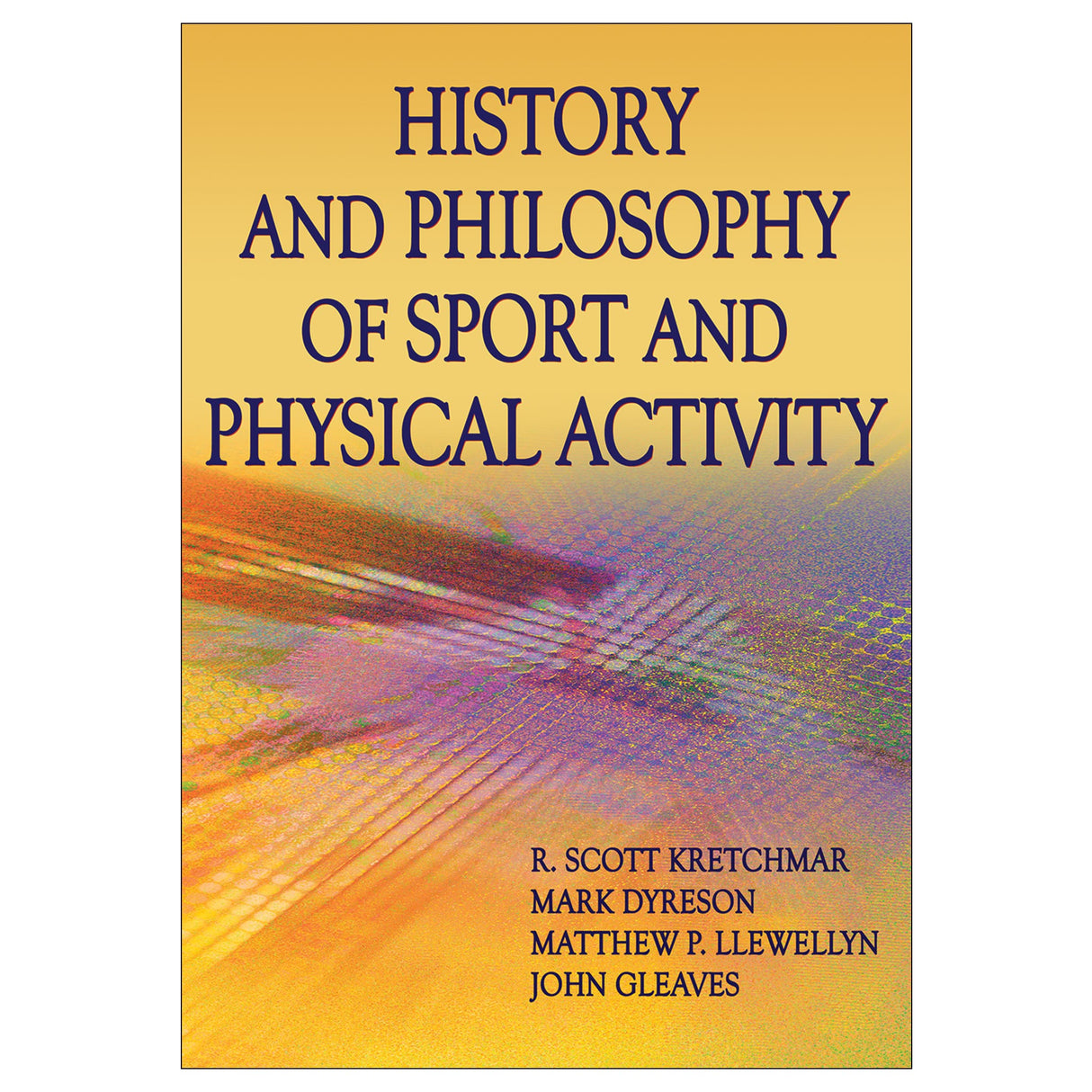History and Philosophy of Sport and Physical Activity
$69.00 CAD
Blending historical grounding and philosophical insights regarding sport and physical activity, History and Philosophy of Sport and Physical Activity covers the historical and philosophical dimensions of the study of human movement. This cross-disciplinary text shows how theory in the humanities can affect professional practice.
The author team, R. Scott Kretchmar, Mark Dyreson, Matthew P. Llewellyn, and John Gleaves, offers philosophical and ethical analyses alongside explorations of changes in culture. The text follows a chronology of human movement from our origins as hunter-gatherers to the present. The authors blend their specific areas of expertise to present a thorough integration of philosophy and history, capitalizing on the strengths of both disciplines.
History and Philosophy of Sport and Physical Activity examines sport and physical activity as a social force. Each chapter provides a historical scaffolding that leads into philosophical discussions about the issues raised. The content is compelling, effective, and accessible for readers.
Student exercise sidebars allow students to explore questions as they go, especially in relating philosophical inquiry to historical events. Historical profile sidebars throughout the chapters allow students to gain greater insight into historical figures and events. Ancillaries include an instructor guide, a presentation package, and a test package to help instructors make the most of the historical, philosophical, anthropological, and sociological issues presented in the book.
History and Philosophy of Sport and Physical Activity is designed to reduce any gap that might exist between good ideas and sound professional behavior. Historical lessons and philosophical analyses are seamlessly integrated.
Readers will understand the intersection of history, culture, ideals, ethics, and professional practice from sport’s leading philosophers and historians.
Audience
A textbook for undergraduate students in kinesiology taking a foundations, philosophy, or history course on sport and physical activity; a reference for academic libraries and sport studies researchers. Also a resource for beginning professionals looking to gain historical and philosophical context on sport and physical activity.
Introduction: History, Philosophy, and Kinesiology
Evolution of Kinesiology
Humanities and the Sciences
Nature of History and Philosophy
Subject Matter of Kinesiology
Wrapping Up and Looking Ahead
Chapter 1: Bodies, Brains, and Cultures: Human Origins and the Riddles of Why People Run
Making Sense of Our Story
Developing a Brief Chronology of Our Story
Great Leaps Forward
Patterns of Culture in Hunter-Forager Societies
Origins of Sport
Work Versus Play
Chapter Wrap-Up
Chapter 2: Transition From Endurance Predators to Farmers: The Birth of Civilizations
Revolution in the Ways We Lived
Impact of the Neolithic Revolution on Human Vigor and Health
Physical Activity as a Tool and a Jewel
Difficulties of Interpreting Ancient Sporting Cultures
Developing a Model of Traditional Sport
Chapter Wrap-Up
Chapter 3: Ancient Greece and the Shape of Modern Sport and Physical Education: Power of the Past in the Present and Future
Foundation of Western Civilization
Myth, Religion, and the Origins of Greek Physical Culture
Birth of Philosophy
Ancient Sporting Festivals
Olympic Games
Greek Sporting Culture
Sources of Evidence for Ancient Greek Sport
Greek Recreation and Physical Education
Chapter Wrap-Up
Chapter 4: Continuity and Change in Physical Cultures: From the Maturation and Decline of Classical Civilizations to the Middle Ages
Monuments to Sporting Spectacles
Comparing and Contrasting Mesoamerican and Roman Spectacles of Blood
Opposition to Gladiatorial Contests
Ethics of Brutality in Sport
Contrast and Continuity
Enduring Martial Arts Traditions
Religious and Intellectual Opposition to Martial Sports
Similarities and Differences in Eastern and Western Sport
Global Continuities and Contrasts
Chapter Wrap-Up
Chapter 5: Expansion of the West and the Birth of the Modern World: Global Transformations of Physical Cultures
Birth of the Modern World
Renaissance, Neoclassical Revivals of Sport, and the Nature of Man
Emergence of Modern Debates on Human Nature
Protestant Reformation and Sport, Physical Education, and the Body
Scientific Revolution and Modern Attitudes Toward Sport, Physical Education, and the Body
Chapter Wrap-Up
Chapter 6: Great Britain and the Birth of Modern Sports: Economic, Political, Social, and Cultural Revolutions
Sport as a Critical Modern Institution
Rationalization of Ethics and Utilitarianism
Rationalization and Gambling
Games for the Common Folk
Rationalization of Fair Play
Chapter Wrap-Up
Chapter 7: Liberty, Equality, Fraternity: Development of Modern Sport
Emergence of Modern Sport
Liberty, Equality, and Morality
Role of Fraternity in Modern Sport
Fraternity, Partisanship, and Spectatorship
Fraternity, Partisanship, and Commercialism
Chapter Wrap-Up
Chapter 8: Games and Empires
Paradoxical Power of Sports
Conquest, Colonialism, and the Spread of Western Sports
Sport in Its Best Light
Subaltern Dilemma
Sport as a Revolutionary Force
Sport, Colonialism, and American Imperialism
Chapter Wrap-Up
Chapter 9: Rise of International Sport Worlds: Olympics, World Cup, and Other Competitions
Reviving the Olympic Games
Olympic Growing Pains
Social Exclusion and Other Harsh Realities of the Early Olympics
Globalization of Modern Sport
Sport in Black and White and Technicolor
Ethics of Commercialism
Chapter Wrap-Up
Chapter 10: The West and the Rest: The Emergence of Critiques and Countercultures to Dominant Forms
Traditional and Indigenous Sport in an Age of Modernity
Western Appropriations of Eastern Muses
Effectiveness of Folk Psychology and Folk Medicine
Encounters with the “Other”
Holistic Kinesiology
Emergence of Countercultural Movement Practices
Chapter Wrap-Up
Chapter 11: The Golden Age of Modern Sport
Phenomenology
Cold War Sport
The Ethics of Performance Enhancement
Breaking Gender Barriers
The Cold War and the Politics of Race in American Sport
The Global Dimensions of Race and Sport
Sport in Living Color
Chapter Wrap-Up
Chapter 12: Snapshots From Our Times
Do Global Connections Create Global Identities?
Global Consumer Culture
The Emergences of New Global Forms of Sport
Chapter Wrap-Up
René Descartes
The Emergence of Advanced Forms of Communication
The Persistence of Local Cultures
Instructor guide. This guide includes chapter overviews, sample course syllabi, teaching tips, class activities, and annotated lists of additional resources.
Test package. More than 140 questions—including fill-in-the-blank, true-or-false, multiple-choice, and short-answer—promote critical thinking.
Presentation package. More than 180 slides can be rearranged, reformatted, and inserted into current presentations based on the needs of each particular classroom.





